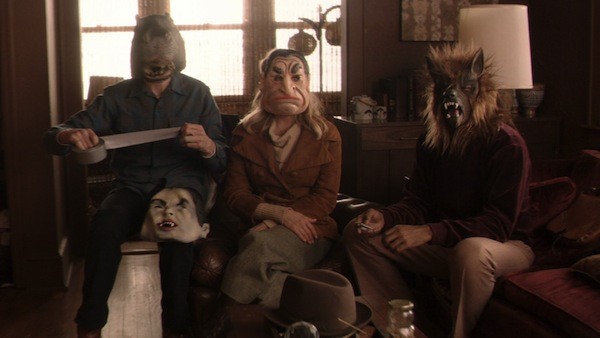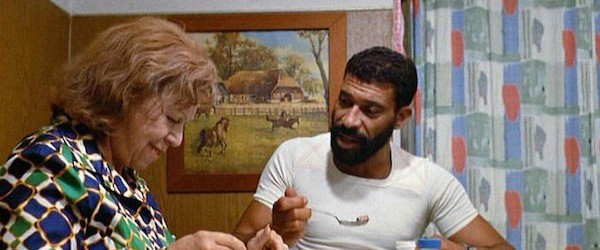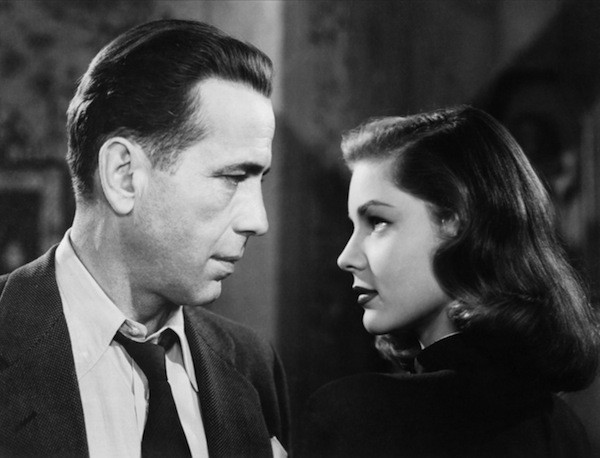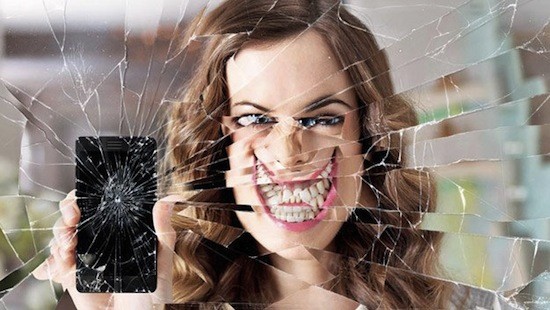
Black Mirror, Series One (2011; dirs. Otto Bathurst [“The National Anthem”], Euros Lyn [“Fifteen Million Merits”], and Brian Welsh [“The Entire History of You”])—Last Friday afternoon, a colleague and friend of mine who has a “Kill Your Television” sticker on the TV monitor in her classroom told me to check out this show. When I arrived at work on Monday morning, I practically ran to her room to thank her for the tip. Black Mirror first aired on BBC4 in December 2011, so I realize I’m a bit late to the party here.
It was worth the wait. Charlie Booker’s latest venture is a real live pop-culture IED, an amalgamation of provocative technophobe fantasies so unsettling that fans and critics describe it as “darkly satirical and funny” almost as a form of self-defense, like stickup victims who tell their assailant “Please, take anything you want, just don’t hurt me.” It is not a funny show, but it might be comic in the sense that it forgoes human greatness to concentrate its scalding rage on human weakness—particularly human vanity. No television show or film has ever made me feel worse about consuming television shows or films. Although its antecedents are difficult to pin down, George Orwell and Aldous Huxley at their most vitriolic certainly come to mind, as does the early work of English filmmaker Peter Watkins. Stanley Kubrick and car commercials are key visual touchstones; each episode is as sleek and aerodynamic as the latest iPhone. Ideally, you shouldn’t know anything about any episode, but the premise of the pilot (“The National Anthem”) is a stroke of disgusting genius as coolly logical as feeding starving Irish people their own children. The second episode, “Fifteen Million Merits,” borrows liberally from both Neveldine/Taylor’s 2009 film Gamer and Bobcat Goldthwait’s 2011 God Bless America, and it is the series high mark; I watched the first half of it while working out on an elliptical machine, which, well, you’ll see why I felt foolish after a while. And how about this: the Black Mirror Christmas special (starring Jon Hamm) airs at 9:30 PM on the Audience Network on December 25. So you can empty the lumps of coal out of your stocking before you stuff your brain with visionary dystopian discomfort. Grade: A

Force Majeure (2014; dir. Ruben Östlund)—A realistic account of a quietly disastrous family vacation at a ski resort in the French Alps photographed so strangely it appears to be a mining colony on an alien planet, Östlund’s shifty and insidious comic drama watches as one man’s moment of weakness spreads and expanding like a poison-gas cloud until everyone recedes into a miasma of self-doubt, nothing looks like it used to and nobody can have any fun anymore. Leisure-as-oppression is not a new storytelling subject, but the small and large ways in which this perky, well-moneyed, physically fit family—mom, dad, two kids (a boy and a girl, of course)—breaks down as they attempt to deal with what they think they’ve seen is as grim and implacable as dwindling daylight in late autumn. It’s very serious, but very funny, too: after all, one resort guest’s emotional breakdown in a hallway is another resort employee’s evening entertainment. Grade: A
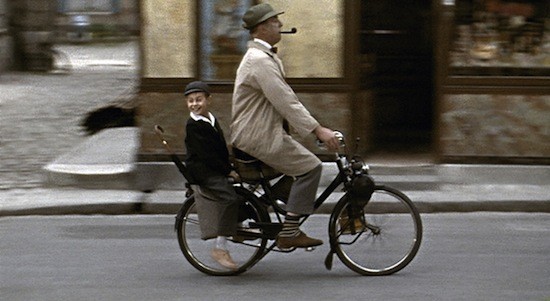
Mon Oncle (1958; dir. Jacques Tati)—Criterion’s new The Complete Jacques Tati boxed set is the Blu-Ray reissue of the year; the supplementary materials, including the outstanding visual essays by Tati expert Stéphane Goudet, offer enough material for a lifetime of study. And you’re damn right I’m going to write about every one of Tati’s features, because 1) he only made a handful of them and 2) they’re all brilliant. His cardinal filmmaking virtues are his patience and his curiosity, both of which take some time to appreciate and understand. At first, Mon Oncle’s canny, confusing visual mazes and oppressive arrangements of blinds, modern furniture and privacy fences make you feel like your eyes are playing tricks on you. But consider that initial disorientation a kind of adjustment to your prescription: after a while you start to see more clearly, which makes it easier to pick out all the little sub-movies running behind, parallel to, and even ahead of the central story. Sure, Mon Oncle is about Monsieur Hulot (Tati) and his fruitless attempts to get a job in a plastics factory. That’s a great movie with some pricelessly whimsical passages in it, and it’s worth getting to know intimately. But Mon Oncle is also a sweet fable about a dachshund trapped in the suburbs who befriends a bunch of stray dogs that live in the city. And it’s an affectionate portrait of some shiftless, mischievous school kids who try to trick people into walking into lampposts when they aren’t confusing motorists and causing minor traffic accidents. It’s a parable about a cool and aloof modernist home that deliberately self-destructs in an effort to evict the officious and dull humans who live inside it, too. It’s whatever movie you want it to be, really. Grade: A+

